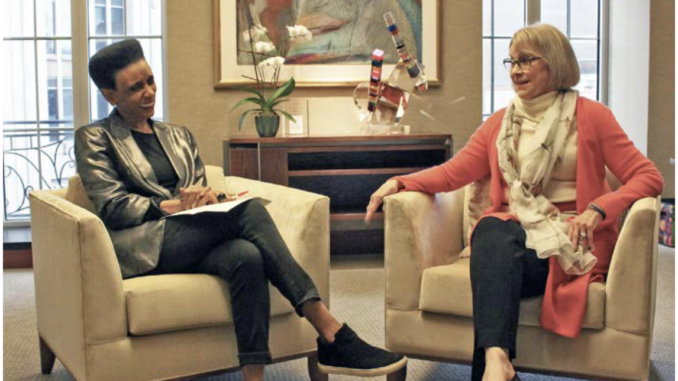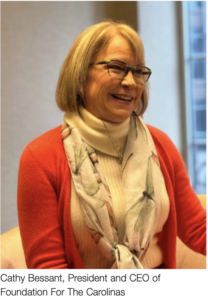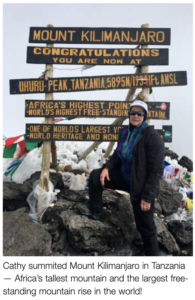
Q&A with Cathy Bessant, President and CEO of Foundation For The Carolinas
By Dee Dixon
Pride Magazine publisher Dee Dixon asked Cathy Bessant, president and CEO of Foundation For The Carolinas some pointed questions about what it’s like to lead such a powerful philanthropic nonprofit community foundation that serves multiple counties in North and South Carolina.
Dee Dixon: Without question, Cathy, you have had an unusually long and varied career path to the top. Please share a bit with us about your life growing up — your family dynamic, your very first job, your high school or college experience. Did any one factor or person serve to help mold you into becoming a high-achieving go-getter?
Cathy Bessant: I hope it hasn’t been “unusually” long! I’m the oldest of four children — we lived in a 900-square-foot home, all six of us, with one bathroom, no shower – so from an early age, I was a go-getter. I was raised in a family of go-getters, so I’ve naturally been an overachiever.
Fortunately, I had a high school home-room teacher who expanded the universe of colleges I should consider. That’s how I ended up at the University of Michigan. I’ve always said, U of M was my pathway. It’s how a girl from Jackson, Michigan, gets to have a favorite restaurant in Hong Kong — education, education, education.
My first job was at McDonald’s. I loved it. I think about it every day. My McDonald’s store had a motto: If you have time to lean, you have time to clean. It’s really influenced how I think about efficiency and multi-tasking.
DD: Even though women seem to be valued in the workforce for their dedication, authenticity and ability to produce and collaborate, only 10% of Fortune 500 companies are led by women. Furthermore, and generally speaking, only about 4.4% of Black women are in management and a much smaller percentage hold C-suite positions. Is there a problem?
CB: The challenges of representation of women at senior levels are real and significant. The hard work of many smart people over a wide range of sectors has not yet produced the type of representation of women, and especially of Black and Latino women, that you would expect.
The challenge, from my perspective, is how do we make all that great work and great intention produce actual results? And what barriers exist that cause women to go down a different path?
I’m very unusual. Of my eight closest friends from college, I’m one of two that is still in the traditional workforce. And these are women with higher level degrees than mine and more education! Here you have eight very bright women, and only two are in the workforce. Why is that? That’s the question we must answer.
DD: A recent article in Diversity Woman’s Elite 100 states that despite the importance of Diversity, Equity and Inclusion (DEI) initiatives, Fortune 100 companies continue to lack diversity. With this in mind, and considering the revocation of affirmative action, what’s it going to take for women and women of color to move forward in the workplace? Is the importance of DEI dead, dying or taking a nap?
CB: Yes, the importance of DEI is very much alive. Successful leaders and successful institutions know it and recognize it. It’s very important that women, and especially women of color, see people like them in leadership roles.
With that said, the focus on Fortune 100 companies is a bit of a red herring. If you look at how students are coming out of college, they aren’t going into the classic Fortune 100 jobs. They have degrees in entrepreneurship or they’re going into consulting jobs or startups, positions that are harder to track.
I think the concept is very much alive, but it’s very hard to measure the progress of women and women of color in what we of previous generations might call the “traditional workplace,” because that’s going away.
DD: Please share how your career path evolved. Did you have a mentor? A sponsor? Was a door opened for you? In simple terms, how did you get on the fast track and how did you manage to stay there?
CB: My career path evolved with two fundamentals: 1. Hard work. There’s no substitute for performance at the task at hand. 2. An openness to try new roles and new responsibilities. Some of my moves were up, some sideways – a few times, hierarchically down, by choice. But I got on the fast track by being open to new and unusual assignments, and by performing without question.
I don’t believe in a single mentor. The strategy I use is a composite mentor — what traits of this leader do I think are authentic and relate to me? Which ones do I not want to emulate? I take the very best of the leaders I see and avoid any derailing behaviors from those same leaders.
DD: Your journey may read to some like a fairy tale. Can we get real for a moment? Please share some of the challenges you’ve faced as a woman leader? What do you consider to have been your greatest challenge? Have you ever failed at anything you can talk about? If so, how did you handle it?
CB: If it reads like a fairy tale, you haven’t met me, because I’m 100 percent real. How it reads and the reality of it are two different things.
Women leaders can be misinterpreted. We can be pigeonholed into “soft” roles. To me, it’s the classic stereotype of how a male boss is seen as “exacting” and a female boss is seen as “demanding.” We get a gender target in the way we are described. But I always tried to leverage the fact that, many times, I was the first or only woman to ever do something. And I always made it clear that I was the first but not the last.
What I often find about challenges is that you don’t really know that something is your greatest challenge until you take it on. I’ve always been someone who sought out challenges – I moved to France without a language skill; I climbed Mount Kilimanjaro with little experience; I went to Cuba on a photography trip and didn’t know how to work a camera. There are hundreds of other examples throughout my career and life.
I love a challenge. It’s why I took this position at Foundation For The Carolinas — to take on the next big challenge.
DD: What has been your greatest success and why?
I always say my greatest success is the next one — and there better be some.
DD: I most recently had to dust off my “Who Moved My Cheese” motivational book. Do you have a particular “go-to” book that gives you a lift when needed?
I don’t know if I have a go-to book for a lift – books give me ideas but not a lift. My family gives me the biggest lift, more than any book. I also turn to music for motivation. I love any song that deals with surviving or overcoming. It’s very motivating.
DD: Foundation For The Carolinas has become an undeniable philanthropic force in the Charlotte community. In fact, there is a statement on your website that says, “We are your community foundation.” What new perspective, if any, do you plan to bring to the table regarding “community,” as the new leader of this organization?
CB: The overarching perspective I have is that the Foundation has been incredibly successful. Yet, we know that what it takes to be successful in the next 10-15 years is not the same as what brought us to this moment. So, where is the consistent reinvention and culture of growth and innovation coming from? How do we build on the great strengths of this organization to be set for the future?
Foundation For The Carolinas — because of its size and leadership — can shape the world of philanthropy. The question driving my work at the Foundation is, How do we take that on?
What advice would you give women in Charlotte who are currently in leadership roles?
CB:There’s no substitute for performance. Perform like crazy. There’s nothing more contagious than performance. I’d also tell them not to underestimate the power of empathy – whether you’re trying to understand your workforce or trying to negotiate a deal.
DD: Cathy, the fact that you reached the summit of Mt. Kilimanjaro absolutely blows my mind! I am fascinated with books such as “Into Thin Air.” What was this experience like and how did it impact your life?
CB: It blows my mind, too! The experience was physically and mentally challenging. Of the two, I’d say the mental challenge was the greatest — and I’m not used to that. I’m used to my mental strength making up for my physical. I’m used to “out-braining” anything.
One impact the experience had on me is that I’m rarely in a room where someone else has done what I’ve done. The quiet feeling of confidence that comes from that knowledge has been very helpful to me.


